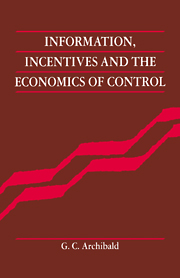Book contents
- Frontmatter
- Contents
- Preface
- Part I Introductory
- Part II Iterative controls
- Part III Non-convexities
- Part IV Cooperatives
- 10 Pareto-improvements and cooperatives
- 11 Achieving Pareto-efficiency in the LMF
- 12 Risk-sharing in Illyria (or the ELMF)
- Appendix: The taxation of economic rent
- Notes
- Bibliography
- Index
10 - Pareto-improvements and cooperatives
Published online by Cambridge University Press: 19 October 2009
- Frontmatter
- Contents
- Preface
- Part I Introductory
- Part II Iterative controls
- Part III Non-convexities
- Part IV Cooperatives
- 10 Pareto-improvements and cooperatives
- 11 Achieving Pareto-efficiency in the LMF
- 12 Risk-sharing in Illyria (or the ELMF)
- Appendix: The taxation of economic rent
- Notes
- Bibliography
- Index
Summary
Pareto-improvements and the prisoners' dilemma
Adaptive control systems may have some desirable properties, particularly in comparison with planning systems, but First Best is clearly unattainable, simple rules derived from it cannot be relied upon and, it seems, the divorce between efficiency and distribution cannot be granted. An immediate question, then, is what scope, if any, is left for applied welfare economics. My concern in this book is with implementation. Is there anything left to implement? An obvious answer is that there still may be cases in which Pareto-improvements are possible; and that we may look for such cases, and suggest, if possible, means to attain the improvements. There is a school of thought which maintains that possibilities of improvement – the attainment even of what we may call “local” efficiency – are all about us, but are commonly blocked by ignorance and prejudice: unenlightened self-interest, in fact. I fear that I do not believe it. Such schools tend to rely overmuch on potential, rather than actual, compensation, relying, it would seem, on the notion that anything that could be done may be regarded as being as good as done. In cases in which distribution is ignored, or left “to the market,” potential losers are neither ignorant nor unenlightened if they resist change, although they are doubtless self-interested. Free trade is a case in point. It is simply not true that all agents always benefit from a move towards freer trade.
- Type
- Chapter
- Information
- Information, Incentives and the Economics of Control , pp. 109 - 116Publisher: Cambridge University PressPrint publication year: 1992



